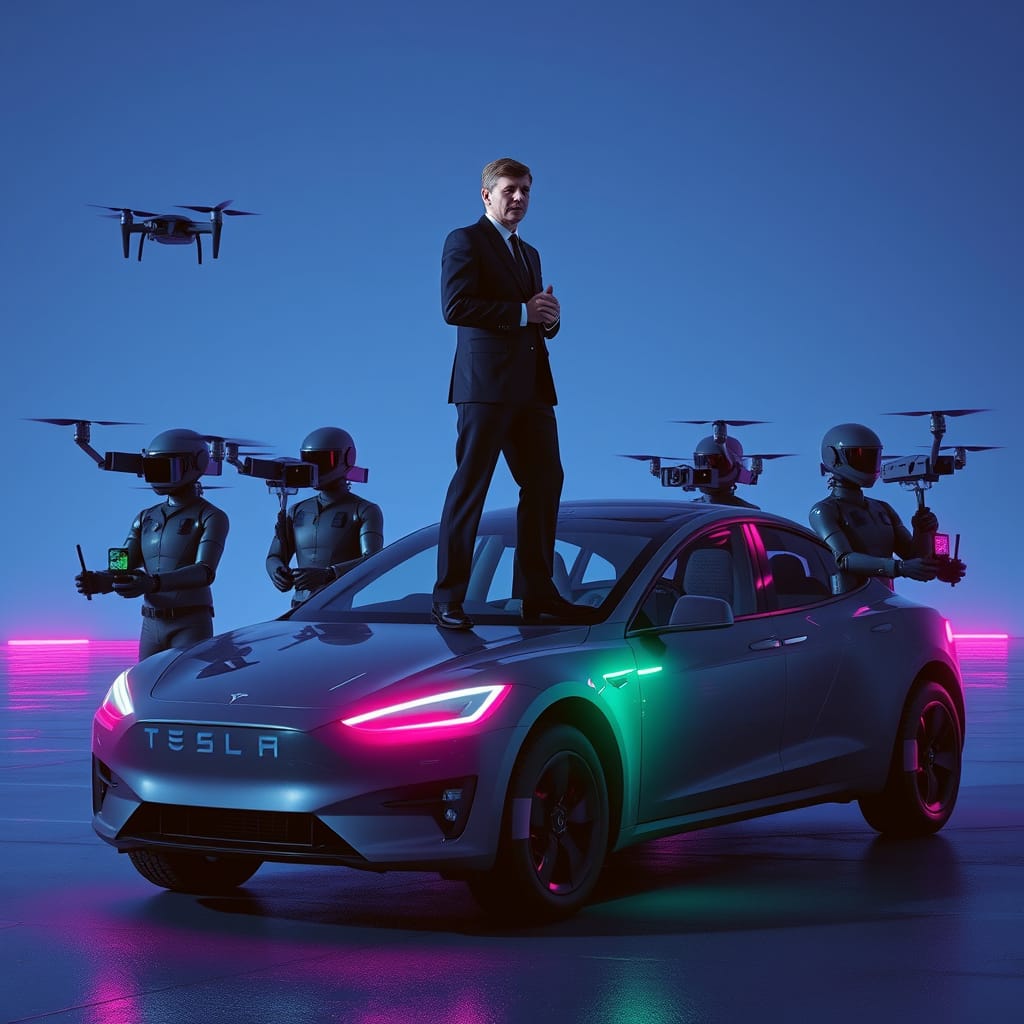A TechOnion investigation into the counterfactual cybersecurity failures of 1963
In a stunning revelation that has sent shockwaves through both the historical and venture capital communities in Silicon Valley, newly declassified documents from a parallel universe suggest that President John F. Kennedy’s assassination could have been entirely prevented with today’s consumer-grade technology. The findings, compiled by the Institute for Retroactive Digital Solutions, paint a picture of what might have been the most technologically sophisticated presidency in American history—if only the Apple iPhone had been invented 44 years earlier.
The Dealey Plaza Data Breach That Never Was
According to quantum tech historians working with advanced temporal analytics, Kennedy’s fatal motorcade through Dallas represented what cybersecurity experts now recognize as a “catastrophic failure of perimeter monitoring protocols.” Dr. Marina Oswald-Porter III, great-niece of the infamous Lee Harvey Oswald and current Chief Innovation Officer at Grassy Knoll Technologies, explains the missed opportunities with the detached precision of someone who has spent decades monetizing family trauma.
“If President Kennedy had access to even a basic Ring doorbell network throughout Dallas, the entire trajectory of American history would have shifted,” she noted during a recent TED talk titled “Disrupting Democracy: How IoT Could Have Saved JFK.” The presentation, which has garnered 2.3 million views and spawned seventeen conspiracy theory podcasts, demonstrates how a comprehensive smart city infrastructure could have identified Lee Harvey Oswald’s suspicious behavioral patterns weeks before November 22, 1963.
The analysis reveals that modern facial recognition technology, combined with social media sentiment analysis, would have flagged Oswald as a “high-risk individual” based on his documented history of defection, domestic violence, and what algorithm specialists now term “concerning posting patterns.” His hypothetical Twitter account, @LoneWolfLee1939, would have triggered multiple automated threat assessments after posting cryptic messages about “making history” and “showing them all.”
Presidential Wearables: The Bulletproof Apple Watch
Perhaps most intriguingly, the report suggests that Kennedy’s well-documented health issues—carefully concealed from the American public during his lifetime—would have made him an ideal early adopter of health monitoring technology. The President’s chronic back pain, Addison’s disease, and various other ailments would have generated a constant stream of biometric data that could have been leveraged for both medical intervention and security purposes.
“Imagine if JFK had been wearing an Apple Watch Ultra with ballistic impact detection,” muses Dr. Theodore Sorensen Jr., a descendant of Kennedy’s speechwriter who now works as a “Presidential Wearables Consultant” for an undisclosed Silicon Valley startup. “The moment that first bullet was fired, his security detail would have received push notifications, his location would have been automatically shared with emergency services, and his vital signs would have been transmitted in real-time to Walter Reed Medical Center.”
The watch could have even triggered an automatic “duck and cover” protocol, sending electromagnetic pulses to nearby vehicles to create an impromptu shield formation. More controversially, some tech ethicists argue that the same technology could have been used to automatically deploy countermeasures, turning the presidential limousine into what one researcher described as “basically a Tesla Cybertruck with diplomatic immunity.”
The Social Media Presidency That Almost Was
Kennedy’s natural charisma and media savvy would have translated seamlessly to the digital age, according to political technologists who specialize in retroactive campaign analysis. His famous “Ask not what your country can do for you” inaugural address would have generated an estimated 47 million retweets and spawned the hashtag #AskNotChallenge, inspiring millions of Americans to post videos of themselves performing acts of public service.
“JFK would have been the first truly viral president,” explains Dr. Jacqueline Bouvier-Samsung, a digital anthropologist whose name is definitely not suspicious at all. “His natural wit, combined with the Kennedy family’s understanding of image management, would have made him absolutely unstoppable on social media platforms.”
The analysis suggests that Kennedy’s Twitter (Now X) presence alone could have prevented the assassination by creating such a massive online following that any assassination threat against him would have been immediately crowdsourced and neutralized by his digital army. The report estimates that @RealJFK would have amassed 89 million followers by November 1963, making any attack against him a direct assault on what researchers term “the first presidential parasocial relationship ecosystem.”
Blockchain Democracy and the Bay of Pigs NFT Collection
More speculatively, the report explores how Kennedy’s presidency might have embraced emerging technologies for governance innovation. His administration’s emphasis on technological advancement—from the space program to nuclear deterrence—suggests he would have been an early adopter of blockchain-based voting systems and smart contract governance protocols.
“The Bay of Pigs invasion could have been managed entirely through a decentralized autonomous organization,” suggests Dr. Robert McNamara-Tesla, a governance technologist whose LinkedIn profile lists his experience as “Disrupting Defense Since 2019.” “Instead of traditional military command structures, the operation could have been crowdsourced through a secure blockchain platform, with real-time feedback from field operatives and automated decision-making protocols.”
The same report controversially suggests that the Cuban Missile Crisis could have been resolved through a series of high-stakes NFT trades, with both Kennedy and Khrushchev minting exclusive digital assets representing their respective nuclear arsenals. The proposed “Mutually Assured Digital Destruction” protocol would have created economic incentives for peace while generating substantial revenue for both superpowers through secondary market trading.
The Zapruder Film Goes Viral
Perhaps most chillingly, the analysis reveals how modern technology would have transformed the documentation and aftermath of the assassination itself. Abraham Zapruder’s famous 8mm film would have been livestreamed across multiple platforms, creating real-time global awareness of the attack and potentially enabling immediate intervention.
“With today’s technology, that motorcade would have been covered by hundreds of smartphones, dozens of security cameras, and probably at least three different TikTok influencers trying to get the perfect selfie with the US President,” notes Dr. Abraham Zapruder III, a content creation specialist who insists his surname is purely coincidental. “The assassination would have been prevented not by government security, but by the sheer impossibility of committing a crime in an environment of total digital surveillance.”
The report suggests that modern deepfake detection algorithms would have immediately identified any attempts to manipulate footage of the event, while blockchain-based evidence management would have prevented the decades of conspiracy theories that followed. Instead of the Warren Commission, the investigation would have been conducted through a transparent, crowdsourced platform where every piece of evidence would be immediately available for public analysis.
The Camelot Metaverse
Most ambitiously, the research explores how Kennedy’s vision of American exceptionalism would have translated to virtual reality and metaverse development. His famous moon landing goal would have been supplemented by an equally ambitious plan to create the first presidential metaverse, where citizens could interact directly with their government through immersive virtual experiences.
“Imagine attending a virtual state dinner at the White House, or participating in a VR recreation of the Cuban Missile Crisis to better understand the decision-making process,” suggests Dr. John Glenn-Oculus, a spatial computing researcher whose career trajectory definitely makes sense. “Kennedy’s presidency would have been the first to truly democratize access to political power through technology.”
The proposed “Camelot Metaverse” would have featured virtual recreations of key historical moments, allowing citizens to experience pivotal decisions from the President’s perspective. Users could have participated in virtual cabinet meetings, experienced the tension of the Berlin Crisis through haptic feedback, or even taken virtual tours of Air Force One while the President was traveling.
The Assassination-Proof Presidency
Ultimately, the report concludes that Kennedy’s assassination represents not just a tragic loss of life, but a catastrophic failure of what researchers term “anticipatory threat mitigation protocols.” In today’s hyperconnected world, the combination of predictive analytics, real-time monitoring, and automated response systems would have made such an attack virtually impossible.
“Every potential threat would have been identified, analyzed, and neutralized before it could manifest,” explains Dr. Secret Service-AI, whose name we’re told is completely normal in their family. “The President would have been surrounded by an invisible digital fortress that would have made him essentially immortal—at least until his term limits expired.”
The technology that could have saved Kennedy—facial recognition, predictive analytics, real-time communication, and automated threat response—is now available to anyone with a smartphone and a Ring doorbell subscription. The irony, researchers note, is that the same technologies that could have prevented the assassination are now primarily used to determine whether that noise outside was a raccoon or an Amazon delivery driver.
The Digital Legacy Question
As we contemplate this alternate timeline where President Kennedy survived to serve multiple terms, established the first presidential podcast, and possibly became the first world leader to achieve billionaire status through strategic cryptocurrency investments, we’re left with profound questions about the relationship between technology and democracy.
Would a digitally-enhanced Kennedy presidency have ushered in an era of unprecedented transparency and citizen engagement? Or would it have created the first truly omniscient surveillance state, where every citizen’s loyalty could be monitored and quantified in real-time? The answer, like most things involving the Kennedy family, remains tantalizingly just out of reach.
What we do know is that somewhere in a parallel universe, President Kennedy is probably posting Instagram stories from the US Oval Office, livestreaming cabinet meetings on Twitch, and dealing with the unique challenges of governing a nation where every citizen has the power to fact-check presidential statements in real-time.
What do you think? Could modern technology have really prevented one of history’s most shocking assassinations? Or would JFK have simply faced different, more sophisticated threats in our digital age? Share your thoughts below—and remember, in the age of deepfakes and AI, even our counterfactual histories need fact-checking.
Enjoyed this dose of uncomfortable truth? This article is just one layer of the onion.
My new book, “The Subtle Art of Not Giving a Prompt,” is the definitive survival manual for the AI age. It’s a guide to thriving in a world of intelligent machines by first admitting everything you fear is wrong (and probably your fault).
If you want to stop panicking about AI and start using it as a tool for your own liberation, this is the book you need. Or you can listen to the audiobook for free on YouTube.
>> Get your copy now (eBook & Paperback available) <<





GIPHY App Key not set. Please check settings